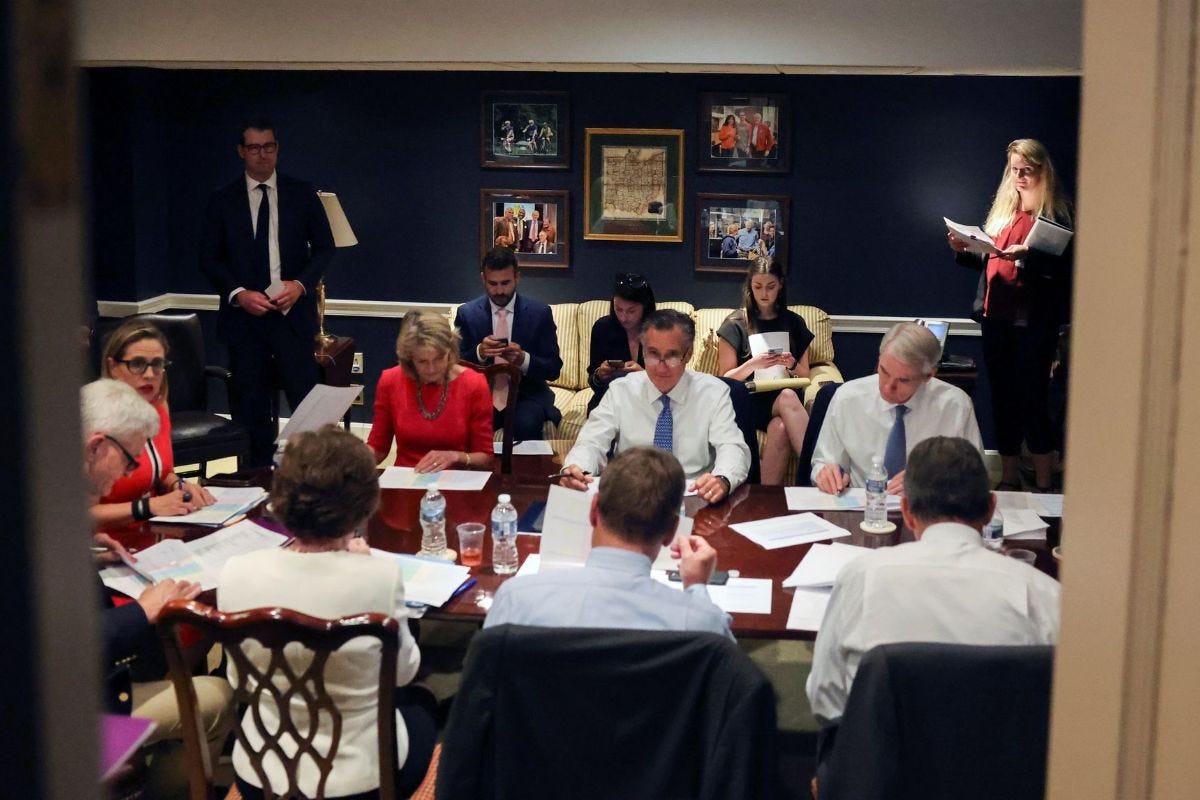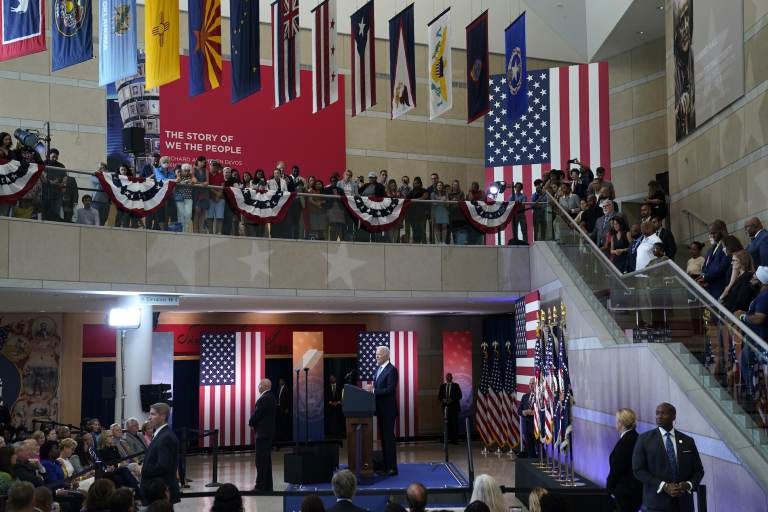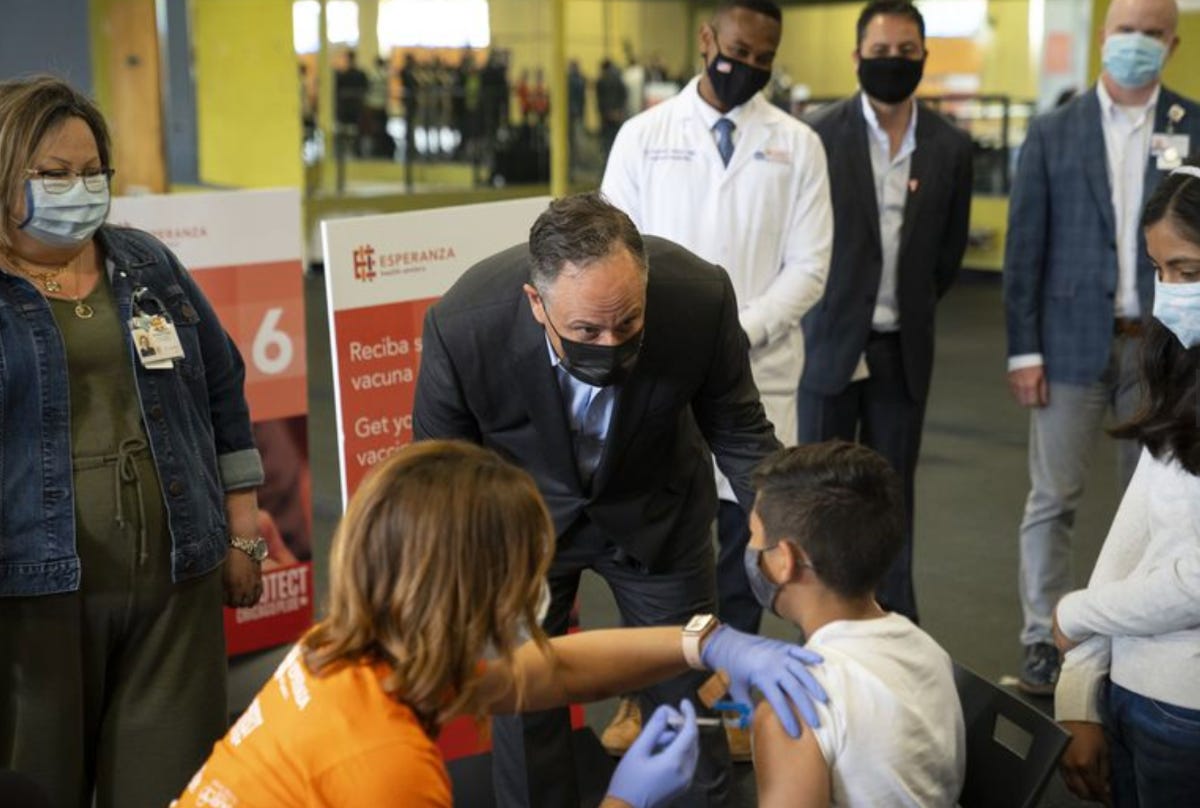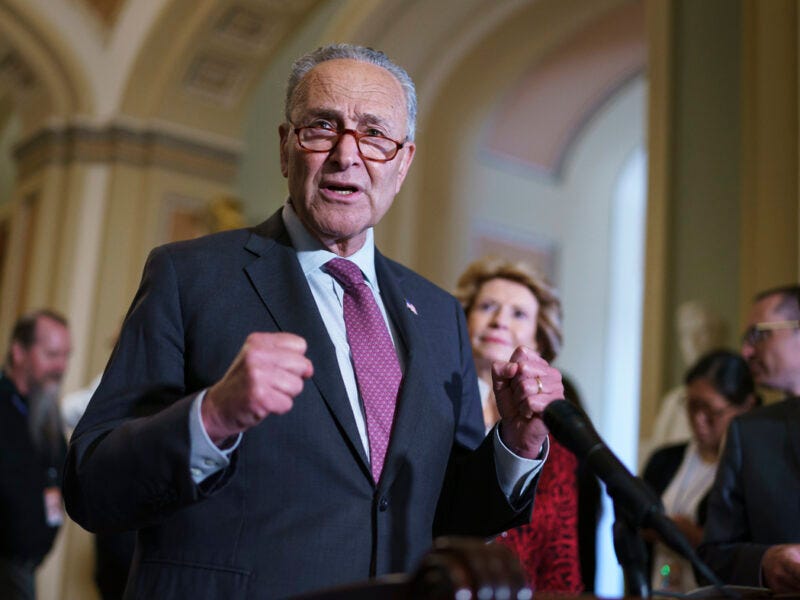Wake Up To Politics - July 14, 2021
Wake Up To Politics: Can Democrats pass their sweeping spending plans?
Good morning! It’s Wednesday, July 14, 2021. Election Day 2022 is 482 days away. Election Day 2024 is 1,210 days away.
Let’s start things off with the latest developments in the infrastructure debate over on Capitol Hill. I know some of this is kind of in the weeds, but I think it’s important for you to know exactly what will be in such a large package (two of them, in fact) and what the legislative process for getting it passed will look like.
So bear with me as we dive into the new spending bill and the hang-ups holding it back. OK, ready to get into the weeds? Let’s go!
Infrastructure update: A look at the massive Democratic package and the hurdles to getting it passed
Senate Majority Leader Chuck Schumer (D-NY) and a coalition of Senate Democrats from across the caucus’ ideological spectrum announced late Tuesday night that they had reached an agreement on a blueprint for a sweeping $3.5 trillion spending package.
The proposal is intended as a companion for the bipartisan bill to rebuild America’s “hard infrastructure,” which would invest $579 billion in new spending over five years on improving roads, bridges, public transit, and airports, as well as the country’s broadband, water, and power infrastructure.
While negotiators are hoping that the bipartisan agreement will overcome the 60-vote filibuster threshold in the Senate, Democrats are preparing to advance the $3.5 trillion package through the filibuster-proof reconciliation process — and to stuff it with key provisions of President Joe Biden’s expansive economic agenda that were left out of the bipartisan compromise.
Democrats did not detail many of the specifics of the reconciliation bill, beyond announcing the topline price tag, but here’s what is likely to be included, per the Washington Post’s Jeff Stein:
Expanding Medicare to cover vision, dental, and hearing for seniors
An extension of the expanded Child Tax Credit, monthly payments of up to $300 for most American families
Climate proposals such as a tax credit for clean energy manufacturing and increased funding for electric vehicle charging stations
Four more years of free schooling for all Americans — two years of universal pre-K and two years of tuition-free community college
An infusion of funding to build and rehabilitate millions of affordable housing units
Investments to subsidize home care for elder Americans, improved child care, and national paid family leave for workers
Democrats are also committing that the reconciliation bill will be “fully paid for,” likely through tax increases on the wealthy, after Sen. Joe Manchin (D-WV) threatened to oppose a package financed by borrowing money (a.k.a. deficit spending) rather than raising new revenue.
That’s all easier said than done. Uniting behind a price tag for the “soft infrastructure” package was a big first step for Democrats, but there are still quite a few hurdles in the way before the two infrastructure bills land on President Biden’s desk. Here are just a few:
→ Keeping both progressive and moderate Democrats in line. Progressives won’t back the bipartisan bill unless the reconciliation bill is advancing, and moderates won’t back the reconciliation bill unless the bipartisan bill is advancing — meaning the fates of these two pieces of legislation are firmly intertwined and require buy-in from both camps of Democrats.
Remember: Democratic unity is especially important for the reconciliation bill, since party leaders can afford to lose exactly zero Democratic senators and only four Democrats in the House to pass a bill along party lines. That means the package will need to be simultaneously big enough for progressives and frugal enough for centrists.
→ Getting 10 Republican votes for the bipartisan bill. It appears that the five GOP authors of the bipartisan plan are still on board, but five other Senate Republicans who had previously expressed support (and are needed to get to 60) are now wavering. Hang-ups include questions over how the plan will be paid for, simmering frustration with the Democratic plan to also move forward with reconciliation, and concerns that more federal spending could exacerbate the already rising inflation rate.
Watch out: The “G10” — the five Democrats and five Republicans working on the bipartisan deal — are aiming to iron out the final details of their agreement by Thursday. But like all deadlines on Capitol Hill, that’s flexible: Sen. Jeanne Shaheen (D-NH) told reporters that if the group isn’t done by tomorrow, “we’re just going to extend the deadline.”
→ Complying with the rules for reconciliation. The budget process is governed by a complex set of regulations that require all provisions in a reconciliation bill to significantly affect spending and revenue. Democrats may attempt to include proposals in the package that tow that line, such as changes to the immigration system.
Power player: As with the $1.9 trillion stimulus package Democrats passed by reconciliation earlier this year, it will ultimately be up to Senate parliamentarian Elizabeth MacDonough to decide what can stay in the package and what must go.
→ The process takes a lot of time, and Democrats don’t have much of it. Democratic leaders are hoping to send both bills to Biden’s desk as early as September. That will take a lot of work, seeing as the legislative text for neither package has been drafted and the reconciliation process includes votes on a budget resolution and two “vote-a-rama” sessions that can take up days. And there aren’t many days left on the legislative calendar this summer: the House is currently scheduled to be in session for only nine more days between now and September 19. (That will likely change.)
More details: CNN’s Manu Raju had a great Twitter thread a few weeks back that will help you navigate each step of the budget process... and give you an idea of just how much time it will take to pass the reconciliation package.

So, as you can see, Democrats shouldn’t celebrate too early when it comes to infrastructure. There’s still a lot standing in the way of their sweeping plans.
But, if they do pull it off, the two packages together will account for approximately $4 trillion in new spending — a major investment in America’s physical infrastructure, care economy, public education system, and more.
Democrats are already beginning to compare the spending plans to a 21st-century version of FDR’s “New Deal.”
“This is the most significant piece of legislation passed since the Great Depression,” Sen. Bernie Sanders (I-VT), the chairman of the Senate Budget Committee, said as the framework for the reconciliation bill was unveiled.
But, Sanders quickly added: “A lot of work remains.”
The Rundown
More top stories to know this morning.
Biden’s big speech: “President Joe Biden declared preserving voting rights an urgent national ‘test of our time’ on Tuesday but offered few concrete proposals to meet it,” the Associated Press reports.
“Speaking at the National Constitution Center in Philadelphia, Biden called state efforts to curtail voting accessibility ‘un-American’ and ‘un-democratic’ and launched a broadside against his predecessor, Donald Trump, who baselessly alleged misconduct in the 2020 election after his defeat.”
Filling the ranks: “President Biden will nominate former senator Jeff Flake (R-Ariz.) to serve as ambassador to Turkey, the White House announced Tuesday,” the Washington Post reports.
“Flake will become the second Arizona Republican to be nominated for an ambassadorship after Cindy McCain, the widow of John McCain, the longtime Republican senator. Cindy McCain was nominated for a United Nations posting in Rome, serving at the agencies for food and agriculture.” Flake and Cindy McCain both crossed party lines to endorse Biden in 2020. Around the world: “Anti-government activists in Cuba say that more than 100 people have been arrested or are missing on the island following widespread protests on Sunday,” CNN reports.
“One person died during clashes with police on Monday, Cuba's Ministry of Interior said Tuesday, according to state-run Radio Rebelde... These are the largest protests on the island in decades, as Cubans complained about a lack of food and medicine as the country undergoes a grave economic crisis aggravated by the Covid-19 pandemic and US sanctions.”

Daybook
What’s happening in Washington today. (All times Eastern)
Executive Branch
→ President Joe Biden will receive his daily intelligence briefing at 10 a.m. Later, he will meet with a bipartisan group of governors and mayors at 3 p.m. to discuss the bipartisan infrastructure package.
Biden and Dr. Anthony Fauci are also slated to meet with 18-year-old singer Olivia Rodrigo to film videos encouraging young Americans to get vaccinated against COVID-19.
Additionally, Biden is expected to meet with Senate Democrats today to discuss the infrastructure packages. (The meetings with Rodrigo and with Democratic lawmakers were not on the official White House schedule for today.)
→ Vice President Kamala Harris will join Biden for his intelligence briefing and meeting with mayors and governors. She will also meet with disabilities advocates at 11:45 a.m. to discuss voting rights.
→ Second Gentleman Doug Emhoff will travel to New Orleans, Louisana. At 12:15 p.m., he will visit a summer camp at a YMCA that is providing children with daily mails as part of the Agriculture Department’s Summer Food Service Program. He will tour the YMCA, participate in the lunch service, and join the YMCA’s sports activities.
At 2 p.m., he will visit a church that is hosting a mobile vaccination clinic and serving as an Agriculture Department food distribution site.
→ White House Press Secretary Jen Psaki will hold her daily press briefing at 12:30 p.m.

Legislative Branch
→ The Senate will convene at 10 a.m. Following Leader remarks, the chamber will proceed to consider the nominations of Jocelyn Samuels to be a member of the Equal Employment Opportunity Commission (EEOC) and Seema Nanda to be the U.S. Solicitor of Labor, the Labor Department’s chief legal officer.
At 11:30 a.m., the chamber will hold cloture votes to advance both nominations. The Senate will then recess until 2 p.m. and then vote on confirmation of both nominations at 2:35 p.m.
Samuels has served as a commissioner of the EEOC, which enforces workplace civil rights laws, since 2020 and is being nominated for a longer five-year term. Nanda previously served as chief of staff for then-Labor Secretary Tom Perez during the Obama administration and was the CEO of the Democratic National Committee (DNC) during Perez’s tenure as its chair.
→ The House is not in session.
→ The Senate Judiciary Subcommittee on Constitution will hold a hearing at 2:30 p.m. on restoring the Voting Rights Act after Shelby County v. Holder and Brnovich v. Democratic National Committee, Supreme Court decisions from 2013 and earlier this year, respectively, that scaled back key provisions of the landmark 1965 law.
→ The House Financial Services Committee will hold a hearing with Federal Reserve Chairman Jay Powell at 12 p.m. on monetary policy and the state of the economy.
→ The House Science, Space, and Technology Committee will hold a hearing at 12 p.m. to hear testimony from physicians on investigating the origins of COVID-19 and future infectious disease outbreaks.
Judicial Branch
→ The Supreme Court is not in session.
Thanks for waking up to politics! If you enjoy reading this newsletter, I’d be so grateful if you’d consider donating to help support me and my work. If you want to show off your support for Wake Up To Politics, you can also buy some merchandise.
Also: don’t forget to tell your friends and family to sign up for the newsletter using your unique referral link. And if you have any questions or comments, feel free to email me at any time.




